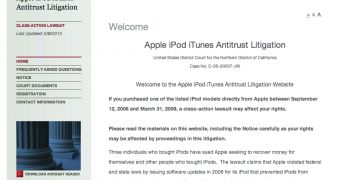If you purchased one of several iPod models directly from Apple between September 12, 2006 and March 31, 2009, your rights may be affected by a class-action lawsuit, Apple has announced.
Apple asks customers to read the materials on this website, including the Notice, as their rights may be affected by ongoing developments in this suit.
The Mac maker explains that the United States District Court for the Northern District of California has decided that everyone who fits the following description is a Class Member:
“All persons or entities in the United States (excluding federal, state and local governmental entities, Apple, its directors, officers and members of their families) who purchased one of the iPod models listed below directly from Apple between September 12, 2006 and March 31, 2009 (“Class Period”).”
A list of iPod models covered by the Class Definition is then provided (see the list here).
In light of the Court’s inability to decide yet, no money is available now. Since the two sides haven’t settled the case, “there is no guarantee that any money will ever be available. If it is, you will be notified about your rights regarding any recovery,” Apple says.
Customers who fit the description have two choices: step out, or wait and hope to be compensated. However, if they choose the latter, customer may have to give up certain rights:
“By doing nothing, you keep the possibility of sharing in any recovery (monetary or otherwise) that may come from a trial or a settlement. But you give up any right you may have to sue Apple separately about the same legal claims in this lawsuit, and you will be bound by the outcome of this case,” Apple’s legal department says.
“If you ask to be excluded you will not be bound by what the Court does in this case and will keep any right you might have to sue Apple separately about the same legal claims in this lawsuit. If a recovery is later awarded in this case, you would not share in that recovery,” the company’s lawyers add.
The Cupertino, California-based electronics vendor denies having done anything wrong.

 14 DAY TRIAL //
14 DAY TRIAL //